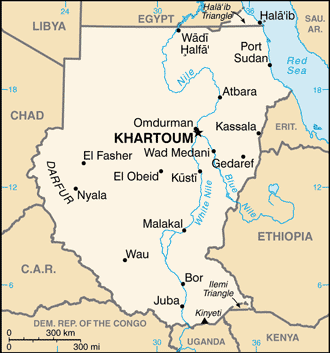Sudan

The Republic of Sudan has an estimated population of 43.2 million (UN, 2010). The capital is Khartoum. Sudan has an area of 2.5 million sq km (966,757 sq miles). The main language is Arabic, English (Offcial), and other tribal languages.
Sudan became independent in 1956 from the United Kingdom. Since its independence, Sudan has been plagued in two prolonged civil war between the North and the South, which has cost the lives of 1.5 million people. The ongoing violence in the Western region of Darfur has displaced an estimated two million people from their homes. Up to 200,000 people have been killed in the Darfur conflict. The large majority of the non-Muslim and non-Arabic population has rejected the implementation of Sharia Law by the government. The conflict in Sudan is seen as one of the worst humanitarian crises in Africa.
Rape is used as a weapon of war to terrorize the population. Tens of thousands of women have been displaced, raped, and killed. Women who reside in refugee camps are in danger of attacks, such as rape, if they go outside the camp. There have been reports of women being raped in front of their family, or abducted and forced to become sex slaves. The Government forces and the allied armed group in Darfur are the main perpetrators of these crimes. The government refuses to admit the existence of widespread of sexual violence and therefore, no actions are being taken to put an end to these atrocities.
- Sudan signed the Protocol to the African Charter on Human and Peoples' Rights on the Rights of Women in Africa (The Maputo Protocol) on the 30th of June 2008 but has not ratified it.
- The Convention on the Elimination of All Forms of Discrimination against Women (CEDAW) has not been signed or ratified by Sudan.
- Sudan has not yet adopted a National Action Plan on United Nations Security Council Resolution 1325 (UNSCR 1325).
- There are two UN peacekeeping mandate in Sudan: African Union-United Nations Hybrid Operation in Darfur (UNAMID) and the United Nations Mission in the Sudan (UNMIS).
Source: BBC, AlertNet, CIA, UN, SIGI,
